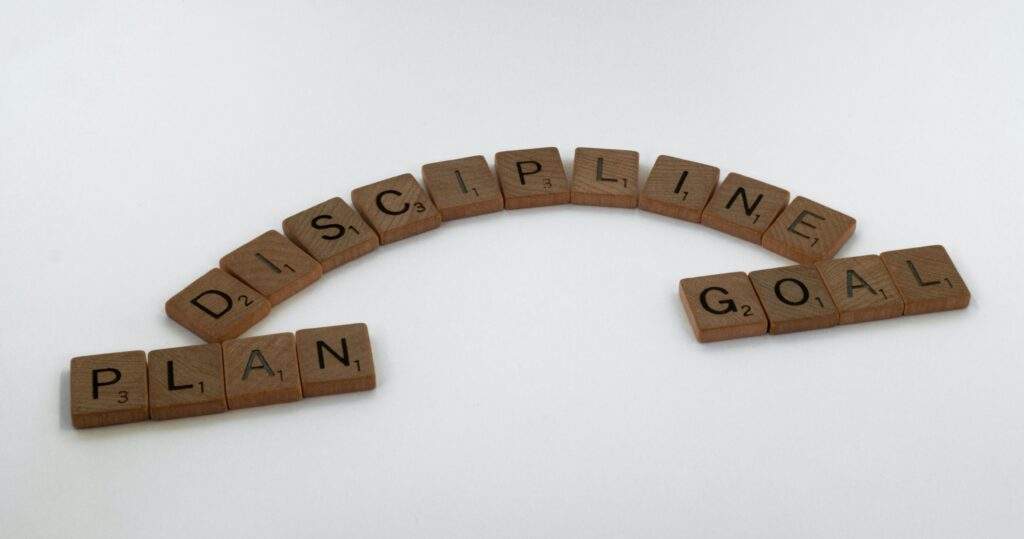This post may contain affiliate links. If you click one and make a purchase, I earn a small commission at no extra cost to you. It helps support the site so I can continue to offer great content to you!

Let’s be honest. Some people are naturally more disciplined than others. I tend to fall into this category. However, there is a lot to be learned from those with highly disciplined lifestyles. In this article, I will try and share how to stay disciplined even if you are not a natural. I want to help you achieve your goals. Let’s jump in.
A higher level of discipline is crucial if you have mid and long-term goals. Laziness and procrastination can impact everyone; it does at one point or another. Wanting something is not enough to predict your ability to achieve it. It’s because excitement fades over time. If the goal isn’t. strong enough or if you don’t have the determination to push through, it’s likely you won’t succeed.
Check out this article for help with goal setting.
Find your why
Goals are crucial for continuous growth and self-improvement. However, I believe that for long-term success, you need to have a strong why or reason.
For example, someone who wants to lose 10 pounds because they think they will look better is less likely to be successful than someone pursuing this goal to become eligible for a life-saving medical procedure.
Your reason to pursue something can be anything. Nobody can tell you if the reason is “good enough” or not. The why only matters to you. It needs to be meaningful and highly important in your eyes.
Go for mid-term
To increase your success rate, your goals should be long enough to allow the habit to be adopted. When you embark on the pursuit of a new objective, you will be highly motivated and excited. You won’t need extra push during the first few days or even the first week. However, as time passes, it will become harder to figure out how to stay disciplined.
For this reason, I like to recommend setting mid-term goals. You want to have enough time to build a new habit. This can take anywhere from 18 to 254 days to form a habit. This wide range isn’t that helpful, but in the end, experts agree that habits become solid and more permanent over time. I like to give it at least 30 days and consistent practice.
On the flip side, a goal with an extensive timeframe can also be hard to stick to. We are conditioned to expect more frequent rewards or gratification. Try setting shorter goals with a clear ending and reward. For example, postpone getting that new pair of shoes for when you accomplish your goal. This will be a great motivator and can help with impulse buying.
Setting quarterly goals is a good starting point. You have enough time to develop the habit but not too long when success seems far out of reach. Celebrating small milestones will help you achieve more.
Make small adjustments
Some of your goals may be ongoing. Perhaps there isn’t a fixed end date for your objective. A good example would be to have the desire to exercise.
While at a glance, this seems like a “forever” goal, there are creative ways to break down this goal into smaller ones while facilitating this to become an ongoing habit.
You could decide to focus on flexibility during the first quarter. Perhaps you set the goal of being able to reach the floor with your fingers while standing up without bending your knees. For the second quarter, you might have a step goal for each day. Each quarter you can have a different target under the same exercising category.
Share your goals
A dominant factor in how to stay disciplined is to share your goals with others. This will automatically make you more accountable. It becomes even more powerful if you find a friend with the same goal who can become your accountability partner.
Sharing your goals means they are important enough to you to be worth explaining to others. The person you decide to share your goal with can help you stick to your goals and encourage you along the way. Furthermore, when you start to lose motivation, they can remind you of your why.
Limit the number of goals
Quality is more important than quantity. You can only make so many changes at any given time. It is critical to prioritize your goals and focus on what is most important to you.
It is unlikely that you will successfully change multiple life-long habits. It’s better to select one priority and accomplish it beautifully than do a mediocre job at a dozen goals.
Depending on the magnitude of your goal, I would not select more than 2 or 3. Having to abandon an objective can bring you a feeling of failure and deter you from continuing to work on other goals. It is much easier to add new ones later if you feel capable.

In conclusion
I love goals and think they are critical in feeling fulfilled, proud, and accomplished. Everyone deserves to feel successful. I hope that reading this article focused on how to stay disciplined will give you the confidence and motivation to tackle your own goals.
Let me know if you have any other tips to help stay motivated.
Thanks for reading.
Cat xx

